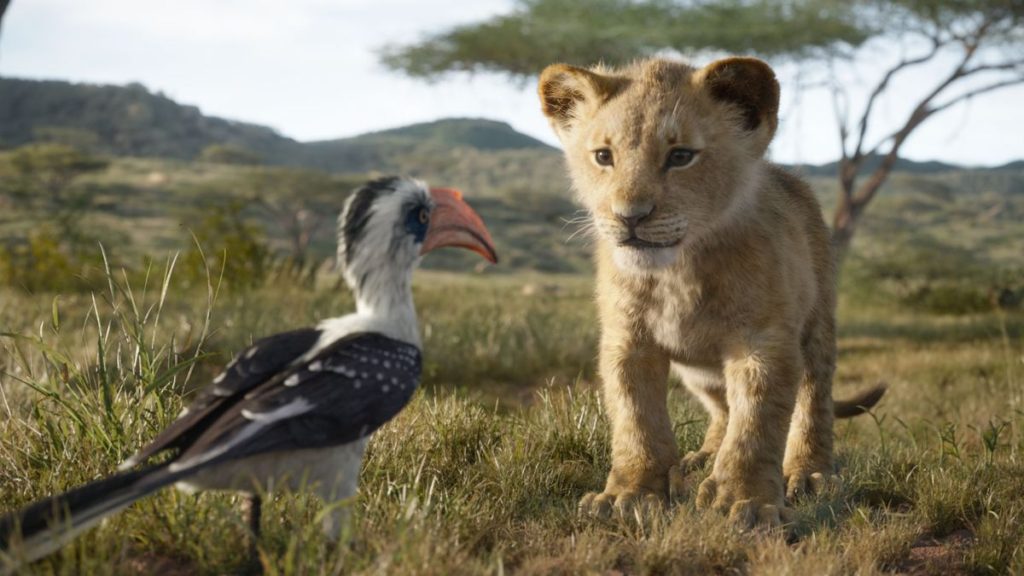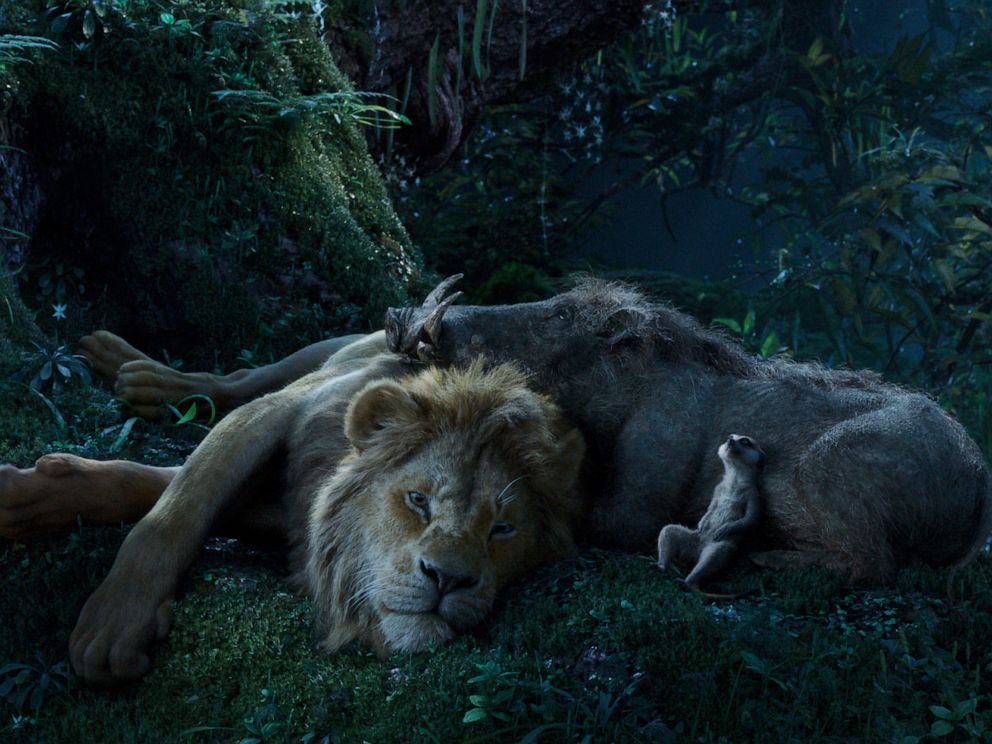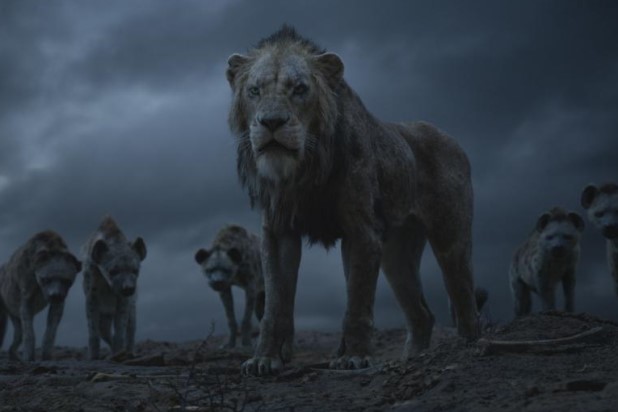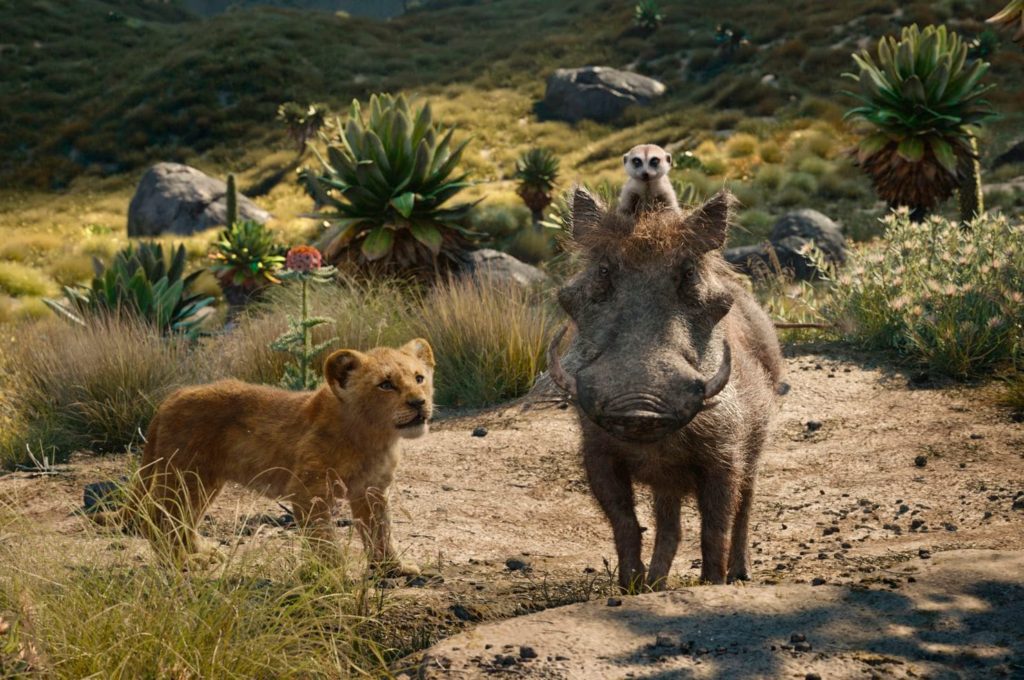
In the new Lion King, the circle of life soothes us all, but especially the Walt Disney Company’s shareholders. Made a quarter-century after the original enchanted audiences with its blend of Shakespeare, music, and fart jokes, this remake takes pains to follow the unwinding path that Carmen Twillie sang about all those years ago. Yet rather than traversing a harmonious circle, this Lion King progresses in a straight line, one pointed squarely back toward the past. In our present era of Disney dominance, everything new is old again.
Directed by Jon Favreau, and taking place in the increasingly populous cinematic netherworld that lies between animation and live action, this new Lion King aspires to remind nostalgic viewers of its predecessor as bluntly and repeatedly as possible. But it is notably different in one respect: It’s longer. Favreau’s version clocks in at 118 minutes, a full half hour greater than the hand-drawn classic. You might think that Favreau and his screenwriter, Jeff Nathanson (whose odd career includes three Spielberg movies, plus a bunch of inferior sequels), would use this additional time to meaningfully expand the film’s universe, perhaps by dynamizing its action or supplementing its story. But while there are a couple of new songs—and while the shot-for-shot concerns that sprang up last year prove unfounded—none of the added material carries any spark of originality. Favreau hasn’t made a movie so much as a museum artifact—a weird, faded echo of a time gone by.
You may feel differently. Analyzing The Lion King is in some ways a self-defeating exercise, because watching it is a uniquely personal experience. I don’t mean that it’s powerful or emotional; it isn’t. I mean that the film is specifically designed to trigger your memories, to trade on the joys and desires that you presumably experienced when seeing these events unfold as a child, whether in a stuffy ’90s auditorium or on a boxy cathode-ray television hooked up to a decrepit VCR or on a gleaming flat-screen. Disney, of course, is not ageist; it’s courting a new generation of acolytes even as it’s appealing to the wistfulness of its longtime fans. This marketing strategy is hardly revolutionary, but far more than most remakes—including the studio’s other recent revivals—what you get out of this new Lion King depends heavily on what you bring into it.

This makes me both an inapt and an ideal viewer here, because whereas the earlier entries in the Disney Renaissance—The Little Mermaid, Aladdin, Beauty and the Beast—seared themselves into my brain to varying degrees, my recollections of the animated Lion King are fuzzy. I remember the basic story, and the songs, and the stampede, and that gorgeous sequence of three friends waltzing in rhythm as time passes around them. But aside from some cackling hyenas, I don’t recall much about the original’s dialogue, its tone, or its overall aesthetic. So I entered Favreau’s version in a somewhat pliable position, capable of appreciating his remake on its own terms.
Alas, those terms are virtually imperceptible, even less apparent than the invisible feats of technological wizardry that allow The Lion King to turn a virtual-reality studio into a teeming savanna. Favreau’s handling of this material is so careful, so tentative, that the film is unable to inspire genuine engagement, much less true awe. It moves with a lethargic quality, dutifully progressing from one familiar scene to the next but never evincing any pleasure in its functional execution. Lions may be deceptively agile creatures, but Disney’s behemoth is sluggish, stolid, and dull.
Even the music is lackluster. The songs of The Lion King, written by Tim Rice and Elton John, are hardly my favorites in the Disney canon, but their prior incarnations had a liveliness to them, a spirit of whimsy and wonder. Favreau’s staging of the musical numbers here, on the other hand, is dispiriting and perfunctory. “I Just Can’t Wait to Be King,” in which the young Simba (voiced as a cub by JD McCrary, then as an adult by Donald Glover) frolics through a prairie and fantasizes about ascending to the throne, is stiff and unimaginative; “Be Prepared,” in which the villainous Scar (Chiwetel Ejiofor) whispers his plans of insurrection, feels both rushed and staid.

Scar, to be fair, is instrumental in one of the movie’s more memorable sequences. As you surely already know, Scar is a Machiavellian schemer who seeks to overthrow his brother, Mufasa (James Earl Jones), Simba’s father and beloved king of the sprawling stretch of land known as Pride Rock. Allying with a trio of feral, dispossessed hyenas, Scar engineers a wildebeest stampede, endangering Simba’s life and baiting Mufasa into a perilous position. The scene in which—spoiler alert!—Scar kills Mufasa, sending him tumbling over an escarpment, has a somber gravity to it. (It is also likely to scare young children.) It’s one of the rare times where Favreau’s direction feels boldly self-assured rather than obediently replicative.
That sequence in turn propels The Lion King into its strongest stretch. Fleeing for his life, Simba encounters the immortal duo of Timon (Billy Eichner), an irritable meerkat, and Pumbaa (Seth Rogen), a cheerful warthog. And when Timon stumbles upon the distraught cub lying in the desert and asks him, “How are you in as few words as possible?” it’s a welcome blast of sarcasm that signals the arrival of a legitimately energetic presence. As Pumbaa, the tubby misfit who struggles with flatulence, Rogen’s casting was practically preordained. But it’s Eichner who proves to be the real standout, investing Timon’s blizzard of insults with vigor and improvisational wit. The pair’s rendition of “Hakuna Matata”, that anthem of blissed-out tranquility, is the film’s only enjoyable song.
And to the extent The Lion King entertains at all, it does so not as a Hamlet-adjacent redemption journey but as an off-kilter comedy. Eichner and Rogen effortlessly parry dialogue like stand-up veterans, while others in the supporting cast earn their own laughs, including John Oliver as a clueless bird and Keegan-Michael Key and Eric André as hyenas who can’t grasp the concept of personal space. The movie’s most innovative moment is a spontaneous recreation of a classic Disney number from a different Renaissance picture; it’s one of the few moments here that’s both playful and audacious.

But while The Lion King does strive to push boundaries, it seeks to do so visually, not narratively. Unlike 2017’s Beauty and the Beast and this summer’s Aladdin, which translated their hand-drawn settings and characters in flesh-and-blood live action, Favreau again deploys the digital techniques that he previously used in The Jungle Book. Of course, that film at least featured one human, the young actor Neel Sethi, who pantomimed his interactions with panthers and tigers in front of a green-screen; here, everything you see is the product of computer code.
Is the gambit successful? Yes and no. On one level, what Favreau and his animators have accomplished is breathtaking. The degree of photorealistic detail on display is extraordinary—the way the lions’ manes ripple in the breeze, the way charging herbivores kick up clouds of dust, the way sunlight glints off the water. But while this realism is undeniably impressive, it isn’t expressive; instead, Favreau’s obsession with zoological accuracy produces strange, diminishing aftereffects. Animals may have souls, but they aren’t humans, and their faces aren’t especially conducive to conveying emotions. As a result, most of the characters in The Lion King are visually blank, failing to communicate feelings of passion or loss. The irony of the movie’s technological success is crippling. The more real it looks, the more fake it seems.
These problems grow most apparent in The Lion King’s final act, when the now-grown Simba reunites with his obligatory love interest, Nala (Beyoncé Knowles-Carter), for a limp rendition of “Can You Feel the Love Tonight?” then returns home for the inevitable showdown with Scar. Favreau may have a gift for sculpting animals from digital clay, but he struggles when putting them in motion. The film’s climactic battle on a cliff is a disaster, a chaotic jumble of leaps and roars. (It doesn’t help that Nala is virtually indistinguishable from Simba’s mother, raising a host of Oedipal questions I’d rather ignore.)
Of course, half-decent cinematic action was never the point of The Lion King; it’s supposed to be a heartwarming story of personal growth and self-discovery. But Favreau’s version fails on both counts. There’s nothing personal here, not when the eerily authentic visuals deprive the characters of their wants and fears. And there’s nothing new to discover, not when this remake is so numbingly faithful. Once you strip those elements away, all that remains is another soulless cog in Disney’s money-making machine, a never-ending circle of lifelessness.
Grade: C
Jeremy Beck is the editor-in-chief of MovieManifesto. He watches more movies and television than he probably should.
